William Hemsworth's Blog, page 126
May 8, 2018
May 8 Gospel Reflection: We Have An Advocate
Jesus said to his disciples:
“Now I am going to the one who sent me,
and not one of you asks me, ‘Where are you going?’
But because I told you this, grief has filled your hearts.
But I tell you the truth, it is better for you that I go.
For if I do not go, the Advocate will not come to you.
But if I go, I will send him to you.
And when he comes he will convict the world
in regard to sin and righteousness and condemnation:
sin, because they do not believe in me;
righteousness, because I am going to the Father
and you will no longer see me;
condemnation, because the ruler of this world has been condemned.”–John 16:5-11
When I read scripture, I often try to put myself in the place of the disciples. I wonder how I would reacts in a particular situation. I have the benefit of looking back and asking the disciples “How did you not see that?” To do that is to miss the point in my opinion. They walked, talked, and ate with Christ. They were friends and went with him wherever he went. At this point in Jesus’s ministry he was telling them that he had to leave, and this was a terrifying prospect for them.
What I find interesting is that not one disciple inquires as to where Jesus is going. They were so terrified at the though of not living with Jesus that they couldn’t gather the courage to ask. As I put myself in their shoes I don’t blame them. I would be terrified as well. Especially after all the bad things that Christ said would happen to those who believe in them. However, that was not the case and he was looking out for them as he does with us.
The Holy Spirit, the advocate, had to come to empower the disciples. In today’s passage we see the disciples as being scared, but when the Holy Spirit comes they boldly proclaim the Gospel, preserve the truth, and helps them teach the ways of God. The Holy Spirit also convicts the world of its sin, and is acts in the defense of the disciples.
Like the disciples we may be afraid and think that Christ has left us. The Holy Spirit is present and working among us even if we don’t realize it. The Holy Spirit works in the Church and through us today. Through scripture and sacred Tradition the Spirit is working for the ultimate good of all of us. Are we open to the Holy Spirit prompting us to action? Are we open to the Holy Spirit telling us that we are doing something wrong? What is the Holy Spirit telling you to do today?

Quote
O Holy Spirit, descend plentifully into my heart. Enlighten the dark corners of this neglected dwelling and scatter there Thy cheerful beams. –Saint Augustine
May 7, 2018
Gospel Reflection: We all Need a Helper
Jesus said to his disciples:
“When the Advocate comes whom I will send you from the Father,
the Spirit of truth who proceeds from the Father,
he will testify to me.
And you also testify,
because you have been with me from the beginning.
“I have told you this so that you may not fall away.
They will expel you from the synagogues;
in fact, the hour is coming when everyone who kills you
will think he is offering worship to God.
They will do this because they have not known either the Father or me.
I have told you this so that when their hour comes
you may remember that I told you.”- John 15:26-16:4A
We all need a helper. From the beginning of creation God said that it was not good for man to be alone (Genesis 2:18). In today’s Gospel passage Jesus is telling the disciples that the world will hate them because they hated Christ. Sometimes we tend to forget that the disciples were Jews, and because they followed and proclaimed Christ they were excommunicated from the fellowship of Israel. They were not able to go into the synagogue and worship as they had always done. This was serious business, and it becomes even more serious when one looks at the Rabbinic interpretation of Numbers 25:1-13 in the Talmud. The rabbinic tradition says that apostates were to be killed as a sacrifice to God. Yikes!
What does all this have to do with us today? Just like the disciples we are in need of a helper. Christ has not left us as orphans, but loves and cares for us. The Holy Spirit was sent from the Father and the Son to be of advocate and comforter. Just as with the disciples the Holy Spirit will give us courage to live in a world that has a growing hatred for Christ and his Church. Take heart and have faith. Christ is with us until the end of the age. The Holy Spirit will help us testify to the person of Christ, and stand up for what is right. Go forth today in the peace of Christ, and ask the Holy Spirit to guide your steps.
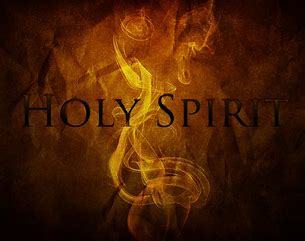
Quote
Enrich your soul in the great goodness of God: The Father is your table, the Son is your food, and the Holy Spirit waits on you and then makes His dwelling in you. — St. Catherine of Siena
May 3, 2018
Apostolic Succession and the Arian Controversy
To those who study Church history the Arians are a familiar foe of orthodoxy. The heresy came to the forefront in the 4th century, and was declared heretical at the Council of Nicea in 325 and again at the Council of Constantinople in 381. How was the proper view of Christ upheld? Was it strictly by St. Athanasius’s brilliant exposition of scripture? No doubt that was part of the equation, but Arius was also pleading his case from sacred scripture.
By all accounts Arius was also a brilliant orator, and was able to get crowds riled up into a frenzy (Olson, 141). He was a charismatic individual who was also able to coat his words with enough of a shadow of orthodoxy to get some bishops to agree with his opinion. So who was Arius, and what was he propagating? Though that question will be answered, the most interesting question is how the heresy was thwarted?
St. Athanasius gets a lot of credit, and deservedly so, for championing orthodoxy against the false view of Christ that Arius was teaching. As previously stated he did so using scripture, but the canon would not have been declared until the Council of Rome is 382 (Marshall). The unsung hero during the whole Arian controversy of the 4th century is apostolic succession, and the teaching authority that springs from it. In this paper, I will look at Arianism and how it is still a factor today. I will also look at the sources from Church history that show how apostolic succession was used to combat the heresy.
WHAT IS ARIANISM?
As previously stated, Arianism is a heresy that became popular in the early Church in the fourth century. It is tempting to say that Arianism was a denial of the full divinity of Christ (Cross, 100). To get the full story of the Arian controversy it is necessary to dig a little deeper. This deeper exploration will assist in understanding, not only the nature of the heresy, but the role that apostolic succession played in getting it condemned.
The beginning of the controversy can be traced to the earliest patristic fathers such as St. Justin, St. Clement of Alexandria, and Origen. This is not suggesting that they were denying the divinity of Christ, but has to do with the idea of the Logos (Gonzalez, 182). The Greek philosophers saw God as immutable, and the philosophers were told that Christians believed in such a God. In regard to the Logos Richard Norris writes, “Logos was the divine reason uttered as the divine Word for the sake of forming and governing the world (Norris, 6). At least that is the understanding that the Stoics and Platonists had as this is not orthodox teaching. This was dangerous as some Christians began to say that the Father was impersonal while the Son, or Logos, was capable of human relationships.
It was hard for a pagan people to understand the Trinitarian concept. Specifically, that the Father, Son, and Hold Spirit have always existed in unity. It was easier to accept that the Son was somehow subordinate, and this is where a priest named Arius enters the doors of Church history. To these pagan converts Arius made Christ out to be a type of divine hero, and that was easier for them to grasp (Shelley, 100).
Arius was a student of Lucian of Alexandria, and while studying under Lucian he became friends with a man by the name of Eusebius of Nicomedia. This Eusebius must not be confused with the great church historian of the same name. Eusebius plays an important role in the promulgation of the Arian heresy.
Arius was a priest who was ordained in Alexandria is 311 (Olson, 144). He was a charismatic individual who came to openly challenge the doctrine of the Trinity that his Bishop, Alexander of Alexandria, was teaching. Many of the locals relayed behind Arius because of his persuasiveness as a public speaker, and used verses such as Proverbs 8:22 to support his doctrine. Proverbs 8:22 states, “The Lord created me at the beginning of his work, the first of his acts of old” (RSV). This basis for Arius’s argumentation continues through Proverbs 8:31, and it describes the role of wisdom in creation. Since Christ is the Logos he is God’s personified wisdom, or reason, on earth. Since this passage of scripture says that he was created then he must not be the same substance of God. If he is not the same substance of God then he must not be fully divine. In this regard Arius writes, “Before he was begotten or created or ordained or established, he did not exist (Pelikan, 192).
In Arius’s view Christ was a created being and he had the tendencies that created being have. This meant that he was even liable to change or even to sin. Saint Athanasius sums up the views of Arius quite nicely. In his first discourse against the Arians he writes:
For what can they say from it, but that ‘God was not always a Father, but became so afterwards; the Son was not always, for He was not before His generation; He is not from the Father, but He, as others, has come into subsistence out of nothing; He is not proper to the Father’s essence, for He is a creature and work?’ And ‘Christ is not very God, but He, as others, was made God by participation; the Son has not exact knowledge of the Father, nor does the Word see the Father perfectly; and neither exactly understands nor knows the Father. He is not the very and only Word of the Father, but is in name only called Word and Wisdom, and is called by grace Son and Power. He is not unalterable, as the Father is, but alterable in nature, as the creatures, and He comes short of apprehending the perfect knowledge of the Father (Schaff, 310).
PASTRISTIC RESPONSE
The temptation when looking at the Arian controversy is to immediately look to the Council of Nicea, but there is much more to the church’s response. As any good Pastor would be, Bishop Alexander became concerned by the teaching of one of his priests. This error has eternal consequences for those who became wooed by this new doctrine. Alexander admits that he initially ignored the false doctrines and hoped they would die out on their own. Plans changed when Bishop Eusebius of Nicomedia came to the aid of Arius. To This Alexander of Alexandria writes:
But seeing that Eusebius, now of Nicomedia, who thinks that the government of the Church rests with him, because retribution has not come upon him for his desertion of Berytus, when he had cast an eye of desire on the Church of the Nicomedians, begins to support these apostates, and has taken upon him to write letters everywhere in their behalf, if by any means he may draw in certain ignorant persons to this most base and antichristian heresy (Schaff, 69).
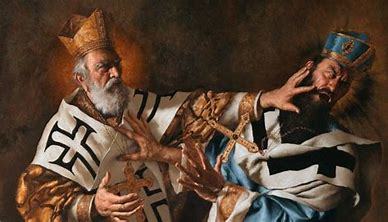
Seeing that a fellow bishop is no longer teaching doctrine that is part of scripture, or sacred tradition Alexander used his authority, received via Apostolic Succession, to try to correct the situation. Alexander of Alexandria called a local synod that formally condemned the teachings of Arius, and letters were sent to surrounding bishops to inform them of the synods conclusion (Ferguson, 192). The way that Alexander pleaded his case against Arius was nothing short of brilliant. As previously stated, Arius said that Jesus could not be God because God is immutable. Alexander’s argument was polemical in nature, but very effective. He said that Arius denied the immutability of the Father by saying that he was not immutable until the son was created (Olson, 148). According to Alexander, “Now when Arius and his fellows made these assertions, and shamelessly avowed them, we being assembled with the Bishops of Egypt and Libya, nearly a hundred in number, anathematized both them and their followers” (Schaff, 70).
Over one hundred bishops exercised their authority that they received by apostolic succession to anathematize Arius and his followers. The teaching that was contrary to the apostles was to risk the salvation of souls. The early fathers had no choice but the exercise their authority. According to the synod there was one view of Christ which was handed down directly from the apostles. Sadly, this would not be the end of the heresy. Though the synod had a near unanimous ruling, the eastern bishops were split.
We look back on this event now and say that this was a serious situation, but a schism this early into the Christian era could have been disastrous. Emperor Constantine heard of the controversy from his Bishop named Hosius (Olson, 148). Regarding this the ancient church historian Socrates Scholasticus writes, “To this end he sent a letter to Alexander and Arius by a trustworthy person named Hosius, who was bishop of Cordova in Spain, and whom the emperor greatly loved and held in the highest estimation” (Scholasticus, 17). Constantine needed Christianity to be unified in an already crumbling Roman empire.
To maintain unity the emperor called all the bishops in the empire for a council. This council would become known as the first ecumenical Council of Nicea. The council commenced in 325 and set a precedent for all other ecumenical councils. This council was so important that all other councils would reference it as being so (Sanders, 18). The council was made of 318 bishops. The Holy Father was absent from the council, not because he was not invited, but because he was too elderly to make the trip. In his place he sent two priests to be legates, and to act in his place and authority. Church Historian William Carroll writes, “The recommendation for a general or ecumenical council . . . had probably already been made to Constantine by Ossius [aka Hosius], and most probably to Pope Silvester as well. Ossius presided over its deliberations; he probably, and two priests of Rome certainly, came as representatives of the Pope” (Carroll, 11).
Championing the orthodox cause at the council was St. Athanasius. Athanasius was a brilliant theologian who argued from scripture the case that Christ is eternal. He argued that terms in scripture such as “was handed over” do not imply that the Son was not divine (Norris, 95). The Council fathers rallied behind St. Athanasius, as he was preaching the faith that had been handed on to them (Schroeder, 14). The great saint said many things, but one struck the heart of Arius’s argument. Regarding the Logos Athanasius said, “It is plain, therefore, to everyone that not knowing is proper to the flesh, whereas the Logos, insofar as he is the Logos, knows all things even before their origination” (Norris, 97). Only God knows all things before their origination. This was a statement of deity that had been passed on from the beginning of the church (Bokenkotter, 51).
Both sides of the controversy appealed to scripture, but the orthodox side coined the usage of a term that is not in scripture to describe Christ’s deity. This Greek work word is known as homoousios. The term means that the Son is of the same substance, or consubstantial, as the Father (Sanders, 18). These are the same words we use at mass when we recite the Nicean creed. The teaching was passed on by valid apostolic succession. The irony is that while the bishops condemned Arianism, the term was a source of controversy. The terminology and definitions were defined more narrowly in 381 at the Council of Constantinople thanks in part to the Cappadocian fathers. Regarding the definition St, Gregory of Nazianzus writes, “Because they are from him, though not after him. Being unoriginate necessarily implies being eternal, but being eternal does not entail being unoriginate” (Nazianzus, 71).
WHY APOSTOLIC SUCCESSION?
In the previous pages thee has been much said about apostolic succession, but I think some clarification is in order. Apostolic succession is much more than one taking an office from a predecessor, though that is part of it. In combating the Gnostics, St. Irenaeus listed apostolic succession as a reason, and boasted in each bishop being able to trace his lineage to the apostles.
In the early days of the church succession and tradition were like terms and were synonymous with the Greek word diadochí (Benedict XVI, 23). Tradition involves teaching, but again it is much more than that. It is forever linked to the person from whom that teaching derives. Pope Emeritus Benedict XVI writes that tradition is “linked to a person, is a living word, that has its concrete reality in faith” (Benedict XVI, 23). Succession is proclaiming something that had been entrusted to someone by Christ himself. In Apostolic succession the lineage is not mutually exclusive from the teaching. They both go hand in hand.
Throughout the Arian controversy, and the modern variations there has been one constant. There was deviation from what was taught in the beginning. Apostolic succession is “holding fast to the apostolic word, just as tradition means the continuing existence of authorized witnesses” (Benedict XVI, 24). Apostolic succession and apostolic tradition assist in defining each other. The succession is the form of the tradition, and the tradition is the content of the succession (Benedict XVI, 28)
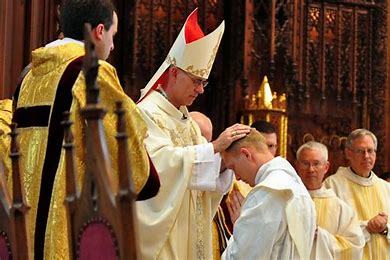
CONCLUSION
It is very tempting to look at the Arian controversy and think that it is a thing of the past. To do so would be irresponsible from a theological and historical perspective. The denying of the divinity of Christ is still something that is an issue among those who call themselves Christians. Jehovah’s Witnesses and Mormons have a view of Christ that is contrary to scripture and to the tradition of the Church. What would Christianity be like today if the bishops in Alexandria and Nicea not exercised the authority given to them by apostolic succession?
The infant Christian church would have experienced a sizable schism. The Roman empire may have possibly collapsed and been thrown into utter chaos. It would have been a disaster. There were men who resisted the temptation, stayed faithful, and championed the cause of apostolic teaching. That is the way the Christ set things up. He established a Church with Apostolic Succession to help guide the flock in the way of the master. As Pope Emeritus Benedict XVI states, “Apostolic succession” is by its nature the living presence of the word in the personal form of the witness. The unbroken continuity of witnesses is derived from the nature of the word as authority and oral statement” (Benedict XVI, 31).
WORKS CITED
Benedict XVI. God’s Word: Scripture—Tradition—Office. Ed. Peter Hünermann and Thomas Söding. Trans. Henry Taylor. San Francisco: Ignatius Press, 2008. Print.
Bokenkotter, Thomas. A Concise History of the Catholic Church. Image Books. New York, NY: 2004. Print.
Cross, F. L., and Elizabeth A. Livingstone, eds. The Oxford dictionary of the Christian Church 2005 : n. pag. Print.
Denzinger, Henry, and Karl Rahner, eds. The Sources of Catholic Dogma. Trans. Roy J. Deferrari. St. Louis, MO: B. Herder Book Co., 1954. Print.
Ferguson Everett. From Christ to the Pre-Reformation. Zondervan. Grand Rapids, MI: 2005. Print.
Fred Sanders & Klaus Issler. Jesus in Trinitarian Perspective. B&H Academic. Nashville, TN: 2007. Print.
Gonzalez, Justo L. The Story of Christianity, Volume 1: The Early Church to the Dawn of the Reformation. HarperOne. New York: 2010. Print.
Gregory of Nazianzus. On God and Christ. St. Vladimir’s Seminary Press. Crestwood, NY: 2002. Print.
Norris, Richard. The Christological Controversy. Fortress Press. Philadelphia, PA: 1980. Print
Pelikan, Jasoslav. The Emergence of the Catholic Tradition. University of Chicago Press. Chicago: 1975. Print.
Schaff, Philip, and Henry Wace, eds. St. Athanasius: Select Works and Letters. Vol. 4. New York: Christian Literature Company, 1892. Print. A Select Library of the Nicene and Post-Nicene Fathers of the Christian Church, Second Series.
Schroeder, H. J. Disciplinary Decrees of the General Councils: Text, Translation, and Commentary. St. Louis, MO; London: B. Herder Book Co., 1937. Print.
Shelby John. Rescuing the Bible from Fundamentalism. Harper Collins. New York: 1991. Print.
Shelley, Bruce L. Church History in Plain Language. Thomas Nelson. Nashville, TN: 2008. Print.
Socrates Scholasticus. A History of the Church in Seven Books. London: Samuel Bagster and Sons, 1844. Print.
William Carroll. The Building of Christendom. Christendom College Press. Front Royal, VA: 1987. Print.
May 2, 2018
Episode 5: The Centrality Of The Eucharist – SoundCloud
Episode 5 of the podcast is now available.
Listen to Episode 5: The Centrality Of The Eucharist by The Bible Catholic Show #np on #SoundCloud
May 1, 2018
Christ and Theology of the Body
From the beginnings of sacred scripture, we read many prophecies about the coming of the Messiah. This first gospel announcement can be seen as early as Genesis 3:15. After much anticipation the Savior is born of a virgin and walked among us. In our fallen state he revealed himself as the “image of the invisible God” (Colossians 1:15 NRSV). Adam sinned in the garden, but Christ is perfect in every way and comes among us as the new Adam. As the new Adam he shows each of the human person as it was intended in the beginning.
This is an important concept when it comes to the Theology of the Body. The body is the mystery of God revealed in human flesh, and this is one factor that makes Christianity logical (Ostrowski 201). The human body is a study of God as it is His creation, and He created us out of love. He wants us to share that love, and as such the marital act of spouses is the created version of His love, making visible the invisible reality of His mystery.
From the beginning God wanted his plan to be plainly visible. Regarding this Christopher West writes, “God wanted this great marital plan of union and eternal life to be so plain to the world that He impressed an image of it right in our bodies by creating us male and female” (Ostrowski 202). Therefore, the model for human sexuality is that which was present before the fall of our first parents. Though we have fallen we have redemption in Christ who showed us the way as the new Adam. We are made for union, and we long for union, but we must only be in union with our spouse. Until then we must be celibate and rely on the grace of Christ to overcome our lustful desires.
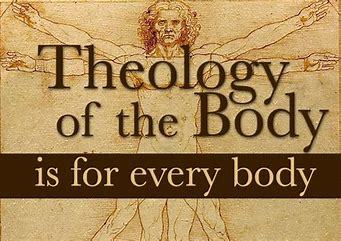
WORKS CITED
Holy Bible, New Revised Standard Version
Ostrowski, Thaddeus ed., Primary Source Readings in Christian Morality. Winona, MN: Saint Mary’s Press, 2008, Print.
April 27, 2018
Christ’s Fulfillment of the Covenants
Throughout the Old Testament there are several instances of God establishing a covenant. He did so with Adam in the Garden, with the nation of Israel through Moses where the Law was delivered, with Noah after the great flood, with Abraham and his descendants, and lastly with King David. These covenants are a part of salvation history that prepared the world for the coming of the Messiah. Each one of these covenants was important and significant, and each one was fulfilled in the person of Jesus Christ. This covenant is known as the new covenant, and it is everlasting. Regarding this the Catechism of the Catholic Church states, “God has revealed himself fully by sending his own Son, in whom he has established his covenant forever. The Son is his Father’s definitive Word; so there will be no further Revelation after him” (CCC para 73).
The Adamic covenant is the first that the Lord had established. As its name states, it was established with our first parents on behalf of all humanity. We read in Genesis 1:26-31 about the creation of mankind, and how God rested on the seventh day. The number seen in the Hebrew language is the number of covenant (Lecture Notes). However, there is a second part of the covenant that applies after the fall. God gives the first Gospel pronouncement which is known as the protoevangelium. Genesis 3:15 states, “I will put enmity between you and the woman, and between your offspring and hers; he will strike your head, and you will strike his heel” (NRSV). Christ is the fulfillment as his death, burial, and resurrection redeemed us from the sin of our first parents.
After the great flood mentioned in Genesis, God made a covenant with Noah never to destroy the Earth with water again (Lecture Notes). The rainbow became a sign of the covenant that God made with Noah. This can be seen in Genesis 9:13 which states, “I have set my bow in the clouds, and it shall be a sign of the covenant between me and the earth” (NRSV). Man will still struggle with sin, but Christ gives strength in the battle. The Vatican II document Gaudium Et Spes states, “But the Lord Himself came to free and strengthen man, renewing him inwardly and casting out the prince of this world” (Ostrowski 18). It also brought into focus the issue of capital punishment in Genesis chapter nine. It took on a new meaning when Christ was crucified. The covenant is for all time and for all people, as is the sacrifice of Christ.
God continued in his promise and made a covenant with Abraham. Genesis 12:2 states, “I will make of you a great nation, and I will bless you, and make your name great, so that you will be a blessing” (NRSV). God promised Abraham descendants as numerous as the stars, and this included those by adoption (Lecture Notes). This was fulfilled in Christ, because having faith in Christ we adopted sons of Abraham as Galatians 3:29 states. In the Mosaic covenant, God made a covenant with the people of Israel. Regarding this Dr. Koehne writes, “Through the leadership of Moses, God freed His people from slavery, then made a covenant with them on Mount Sinai” (Lecture Notes). Christ fulfills the covenant by showing us how to live the law and calling to a higher standard of living as Christians. This can only be done through his grace and mercy.
Lastly, God made a covenant with King David and said that through his lineage the Messiah would be born. The promise can be seen in 2 Samuel 7:12-13 which states, “ When your days are fulfilled and you lie down with your ancestors, I will raise up your offspring after you, who shall come forth from your body, and I will establish his kingdom. He shall build a house for my name, and I will establish the throne of his kingdom forever” (NRSV).
In St. Augustine’s great work the City of God he equates King David to an Old Testament prefigurement of Christ (Newadvent.com). This covenant is fulfilled because he is proven to be in David’s lineage as is seen in Matthew Chapter one, and his kingdom will have no end.
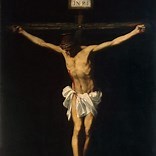
Works Cited
Catholic Church, Catechism of the Catholic Church, 2 ed. New York: Doubleday, 2003. Print.
Ostrowski, Thaddeus ed., Primary Source Readings in Christian Morality. Winona, MN: Saint Mary’s Press, 2008, Print.
Dods, Marcus. From Nicene and Post-Nicene Fathers, First Series, Vol. 2. Edited by Philip Schaff. (Buffalo, NY: Christian Literature Publishing Co., 1887.) Revised and edited for New Advent by Kevin Knight. <http://www.newadvent.org/fathers/120117.htm>.
Holy Bible, New Revised Standard Version
April 25, 2018
Book Review: A Call To Mercy
She had untold influence in her community, the church, and the world. She gave up worldly comforts to comfort those who had nothing. The book A Call to Mercy documents the life of Mother Teresa. There have been many books published about this wonderful woman, but this one is different. This one is testimonials from those closest to her, and a lot of the book is in her own words.
Though she is known best for her work in Calcutta, the book includes her work from around the world. No matter where she was she sought to serve. One such story is when she was honored with the Nobel Peace prize in Oslo. It is customary to have a large banquet, but she had a glass of water and asked that the banquet be cancelled and the food given to those in need. There are many such stories in the book that will challenge every reader to live out the words of Christ in Matthew 25:40. That passage of scripture states, “‘Truly I tell you, whatever you did for one of the least of these brothers and sisters of mine, you did for me.”
The book is arranged in a way to correspond with the works of mercy. At the end of each chapter are passages of scripture for reflection, and a prayer to assist the reader in implanting what was read. The book is humbling and is one that will change your outlook on those around you. We encounter those who are hungry, hurting, and just need someone to show them love and mercy on a daily basis. This book will challenge one to assist however they can.
[I received this book from the Blogging for Books program in exchange for an honest review.]
Episode 4: The Church is One, Holy, Catholic, and Apostolic – SoundCloud
This week’s episode of the podcast is now available.
Listen to Episode 4: The Church is One, Holy, Catholic, and Apostolic by The Bible Catholic Show #np on #SoundCloud
https://soundcloud.com/user-682230997/episode-4-the-church-is-one-holy-catholic-and-apostolic
April 23, 2018
Theotokos and the Council of Ephesus
Within the early church there were many issues when it came to Christology. Some would take a piece of scripture and develop a whole theology without properly exegeting or considering what other scriptures say on an issue. To put it in modern terms it was proof texting, but on a grandiose scale. A scale in which souls were at stake. The Council of Ephesus was called to discuss the unity of Christ. More specifically, how can he be truly God and truly human? As if this issue were not enough to cause division there was a political component as well. The Christian patriarchs of Antioch, Constantinople, and Alexandria had a rivalry which stemmed from Constantinople calling itself the “New Rome”. At the center of the council were two bishops by the names of Nestorius and St. Cyril of Alexandria.
Nestorius was a priest who became the patriarch of Constantinople. He was trained in Antioch which had a very good reputation of defending the humanity of Christ. Nestorius starts with diversity in Christ (two natures) then gets into trouble when trying to explain how they come together. In attempting to explain the humanity of Christ, Nestorius looked at the blessed virgin Mary. Most churches at the time called Mary the theotokos, or mother of God. Nestorius made the suggestion that Mary should have the title of theodochos, or the recipient of God (Norris 26). Later on he would make the suggestion to call her Christotokos, or the mother of Christ. By doing this Nestorius was making an attempt to preserve the humanity of Christ, but the way he did so was complex and in the end failed to preserve the unity of Christ.
Nestorius used a Stoic concept of what makes an individual in his argument. Properties are inseparable to the person, and Nestorius believed that Christ should exist as two individuals (hypostasis) or two person (prosopon). He didn’t believe that natures changed which is good because that would make him just like Apollinaris about a century earlier. Since natures can’t change Nestorius proposed that there was a third person involved (Lecture Notes). Problem is Christ only has two natures, and third nature or person being involved is a big Christological problem.
Hearing the argument of Nestorius, Cyril took the opportunity to say that Christ was one individual. He did this by employing the term mia physis, or one nature. To Cyril, the view of Nestorius implied that there were two different Christ’s. By saying that there is one nature, Cyril is not saying that Christ did not have a human nature. He is saying that there is a human soul that is in union with his divinity. This term is known as the hypostatic union and is still a term that is used today.
Nestorius was eventually condemned at the Council of Ephesus for his “two sons” doctrine (Norris 28). Cyril, who by all accounts was very uncharitable to Nestorius, called him a “New Judas”. The council righty confirmed the orthodox position of Mary being the theotokos. She gave birth to the whole person of Christ, not just his humanity. To think the divine came later would be a type of adoptionism. The council was crucial in upholding the humanity and the divinity of Christ, and it is one we can look to today for those who deny the theotokos.
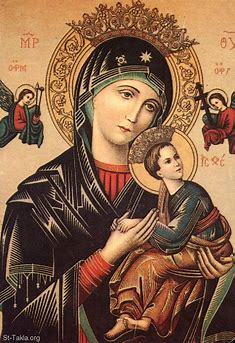
Works Cited
Norris, Richard A. The Christological Controversy. Fortress Press Philadephia: PA, 1980. Print.
April 17, 2018
Episode 3: Purgatory: What it is and what it is not
In this week’s episode of the podcast I discuss what purgatory is and isn’t. I discuss common Protestant objections, and give answers from scripture.
[image error]
Listen to Episode 3: Purgatory: What it is and what it is not by The Bible Catholic Show #np on #SoundCloud
William Hemsworth's Blog
- William Hemsworth's profile
- 7 followers



